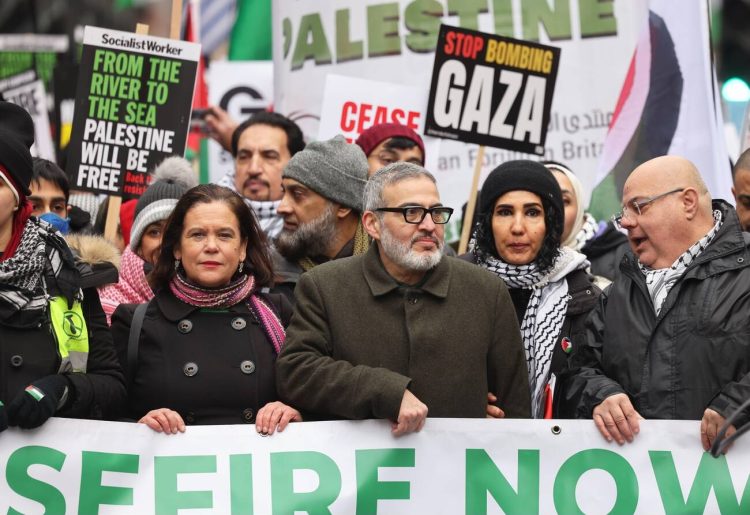In recent weeks, Sinn Féin Support for Gaza has focused on medical evacuations of seriously ill children. Party leader Mary Lou McDonald has repeatedly urged the Irish Government to speed up these evacuations. She called any delay a “matter of life and death.” She warned that visa wrangling could cost children’s lives. At a recent London briefing, Sinn Féin MPs Pat Cullen and John Finucane stressed the duty to evacuate children. Sinn Féin Support for Gaza had Donnchadh Ó Laoghaire condemn Israeli airstrikes as an “appalling breach” of the ceasefire. Politically, Sinn Féin continues to back a permanent ceasefire. The party also seeks closer diplomatic ties with Palestine. Sinn Féin calls for the enactment of the Occupied Territories Bill. Fianna Fáil and Fine Gael face accusations of blocking this legislation.
McDonald Urges Urgent Action as Gaza Children Casualties Rise
As a core element of Sinn Féin Support for Gaza, Mary Lou McDonald has repeatedly sounded the alarm over the mounting death toll among Gaza’s youth. With Gaza’s Health Ministry reporting over 57,000 Palestinian fatalities in the 21-month conflict—the majority believed to be women and children. Sinn Féin’s Foreign Affairs spokesperson, Donnchadh Ó Laoghaire, condemned the “appalling breach of the ceasefire” after last night’s air strikes killed hundreds, including many children, urging immediate international pressure on Israel.
In a letter to Tánaiste Simon Harris on 5 July, Mary Lou McDonald voiced “deep concern and alarm” over the Government’s decision to pause the evacuation of very sick children from Gaza to Ireland, warning that any further delay is “a matter of life and death”. She pressed the Government in the Dáil to expedite the medical evacuation of the next group of 18 paediatric patients—whose assessments and transport arrangements are complete—without further “bureaucratic wrangling” that risks costing young lives.
This urgent appeal builds on Sinn Féin’s long-standing policy of demanding robust humanitarian interventions in Gaza, including an immediate ceasefire and sanctions on Israel, as outlined in the party’s manifesto.
Sinn Féin Support for Gaza
Sinn Féin Support for Gaza has driven the party’s relentless advocacy both in the Dáil and on the international stage. Key pillars of their approach include:
- Demanded an immediate ceasefire to halt further loss of life and relieve an overwhelmed health system
- Sinn Féin has called for secure humanitarian corridors and logistical support to evacuate and treat Gaza’s sick children
It urged the international community to “step up” funding, transport, and diplomatic measures.
- Sinn Féin pressed for targeted sanctions on Israel and the rapid passage of the Occupied Territories Bill.
It seeks to hold Israel accountable for settlement activity and breaches of humanitarian law. - Mary Lou McDonald championed medical evacuations and warned that visa processing delays could cost young lives.
She demanded that Gaza’s gravely ill children be evacuated to Ireland without delay.
Domestically, Sinn Féin has made passage of the Occupied Territories Bill a cornerstone of its Gaza policy. The party accuses both government benches—Fine Gael and Fianna Fáil—of blocking the legislation, and has vowed to develop “closer diplomatic ties with Palestine” while imposing targeted sanctions on Israel for its “illegal occupation and brutal apartheid regime against the Palestinian people”. This dual strategy—combining decisive legislative action at home with vigorous advocacy abroad—underpins Sinn Féin’s positioning as Ireland’s leading party on Gaza’s humanitarian crisis.
Logistical Challenges of Medical Evacuations
Evacuation missions have been plagued by administrative delays and complex logistical hurdles. Sinn Féin leader Mary Lou McDonald has warned that the Government’s decision to “pause” plans for the next medical flights — citing interdepartmental visa disputes — represents “bureaucratic wrangling” that could cost young lives.
At least eight paediatric patients were selected for urgent evacuation from Gaza in early June, and their medical assessments and transport plans have been fully completed. However, flights are not expected until the autumn due to unresolved visa arrangements for siblings and carers. This over-reliance on a single air-corridor through Egypt has also compounded delays. McDonald has called for Jordan to be added as an approved evacuation route to diversify transport options and reduce border-crossing bottlenecks. paediatric
Ceasefire Now: The Human Cost of Delay
As part of Sinn Féin Support for Gaza, the party has demanded an immediate ceasefire.
Medical sources report at least 57,130 Palestinians killed and 135,173 wounded as of 3 July 2025. This reflects increases of over 6,572 deaths and 23,132 injuries since the collapse of the last ceasefire.
Every day of delay in securing a lasting ceasefire adds hundreds of casualties. This surge in casualties overwhelms Gaza’s already shattered health system.
Global leaders and agencies have repeatedly echoed this call. During the Rome summit on 12 June, the foreign ministers of France, Germany, Italy, Poland, Spain, and the United Kingdom joined the EU High Representative in demanding an immediate ceasefire to halt the “unprecedented rate of civilian killing”. The UN Rights Chief echoed this urgency in late June, declaring that “only an immediate ceasefire leading to a two-state solution…can offer sustainable peace,” and warning that further delay would deepen Gaza’s humanitarian collapse.
Next Steps: From Evacuation to Reconstruction
As part of Sinn Féin Support for Gaza, the party championed lifesaving medical evacuations. It also signalled strong endorsement for a comprehensive post-conflict rebuilding effort.
At the emergency Arab Summit in Cairo on 4 March 2025, President Mahmoud Abbas commended the Egyptian-Palestinian-Arab reconstruction plan—stressing that it must proceed with Gaza’s inhabitants remaining on their homeland and without displacement—and called on international partners, including the EU, to back its implementation.
Yet the scale of the task is immense. A United Nations damage assessments show over 50 million tonnes of rubble litter Gaza, with debris clearance alone projected to cost up to USD 1.2 billion and take 21 years; only then can reconstruction of more than 245,000 housing units, hospitals, schools, water treatment plants, and vital agricultural land begin.





























